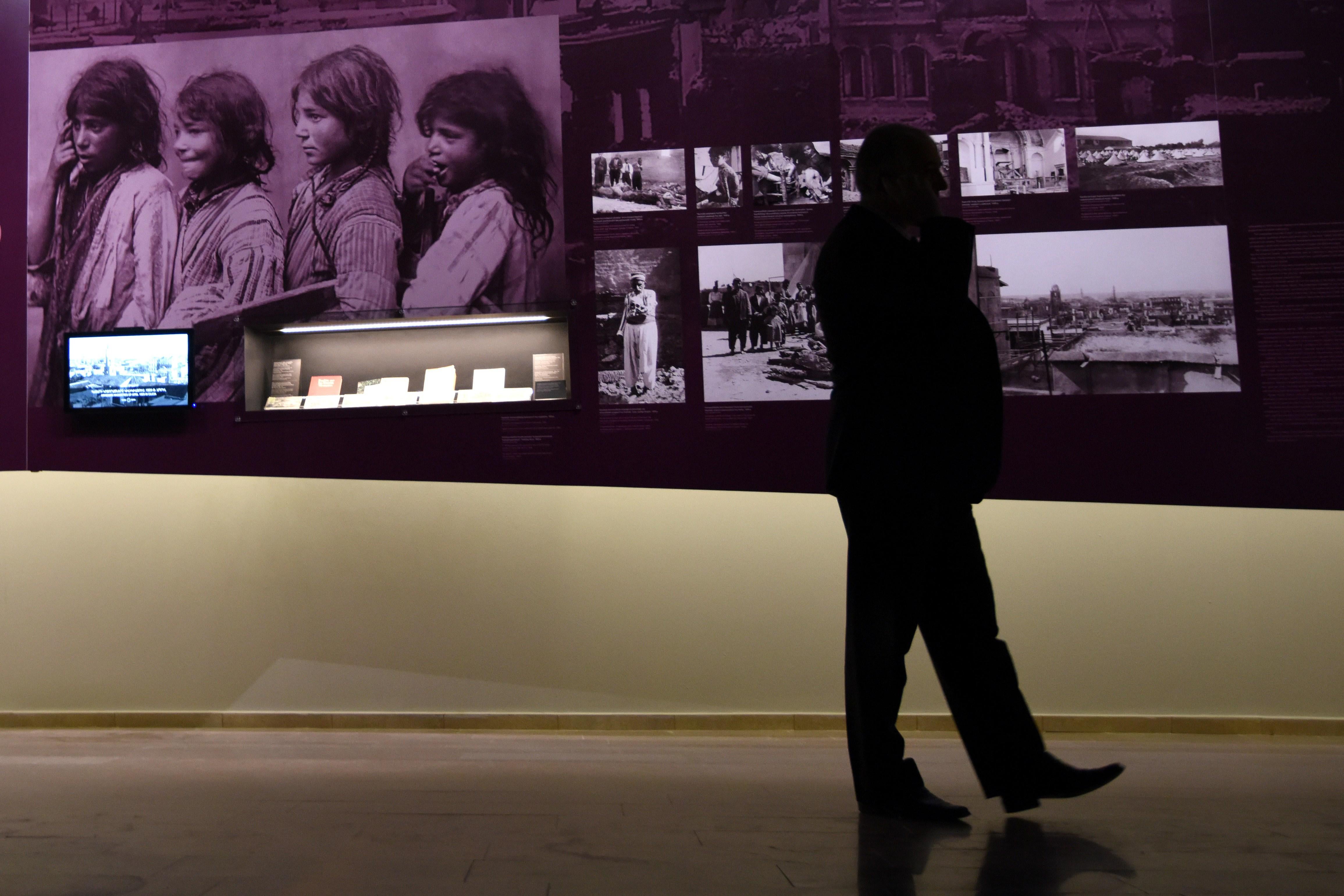In April 1915, when the Turkish government rounded up a group of Armenian intellectuals in Constantinople, kicking off a campaign that historians estimate would kill about 1.5 million Armenians, the coining of the term genocide was still three decades away. The mass killing of an ethnic or religious group was a crime without a name. One hundred years later, the Turkish government would prefer it stayed that way.
The anniversary of the Armenian genocide has become an annual ritual of outrage and umbrage-taking, but stakes this year are higher than normal. (And not just thanks to the unexpected publicity surrounding the Kardashians’ visit to their homeland.) At a Sunday Mass earlier this month, Pope Francis called the killing a genocide, comparing it to the crimes committed under Nazism and Stalinism, prompting a furious rebuke from Turkish Prime Minister Recep Tayyip Erdogan. The government of Germany, Turkey’s largest trading partner and home to millions of Turkish immigrants, also used the word for the first time to describe the events.
President Obama doesn’t seem likely to follow suit. Just like his predecessors, Obama used the G-word on the campaign trail while wooing Armenian American voters and promised to do so as president—but reneged once he got into office and had to deal with the sensitivity of strategically vital Turkey. This year the White House put out a statement saying that “the president and other senior administration officials have repeatedly acknowledged as historical fact that 1.5 million Armenians were massacred or marched to their deaths in the final days of the Ottoman Empire,” but conspicuously did not use the word genocide. Like torture (“enhanced interrogation”) and coup (“change in government”), genocide is one of those terms that is very hard for senior government officials to say even when they’re describing the exact definition of it.
Of the 2016 candidates, Ted Cruz was first out of the gate in pledging to use the word as president, but hopefully Armenian voters have learned not to take these pledges too seriously. Disappointingly, the largest umbrella organization of American Muslim organizations has taken the Turkish government’s side by warning against alienating a key Middle East ally with a “one-sided interpretation of the 1915 events.”
While Turkey disputes foreign historians’ accounts of the massacre itself and Turkish textbooks continue to justify efforts to suppress Armenian separatism during World War I, it often seems that the issue is less about what happened than what to call it. The government is gradually getting more permissive about allowing discussion of the events. Last April, Erdogan came remarkably close to acknowledging the killing in a statement that expressed condolences for the deaths of “Armenians who lost their lives in the context of the early 20th century,” though he steadfastly refused to acknowledge that a genocide had taken place. This year Turkey has been accused of trying to distract from the anniversary by rescheduling an official commemoration of the Battle of Gallipoli for the same day.
The controversy over what to label the events is ironic, since it was the displacement and killing of Armenians during World War I that largely inspired the concept of genocide. The word was coined by the lawyer Raphael Lemkin, a Polish Jew who was himself a victim of the crime, having fled to the U.S. in 1941, leaving behind parents who were later killed in the concentration camps. But, as recalled in the recent documentary Watchers of the Sky, Lemkin first became interested in defining the crime of mass murder of a particular group in the 1920s while he was a law student following the unsuccessful attempt to bring the perpetrators of the Armenian massacre to justice. Lemkin, who would go on to devote his life to the banning of genocide under international law, understood that before a crime could be outlawed it had to be named. He first tried out unsuccessful terms like barbarity and vandalism on skeptical audiences before settling on genocide.
It wasn’t just victims of genocide who drew lessons from what happened in 1915. In explaining his decision to attack Poland, Adolf Hitler told his subordinates, “Who, after all, speaks today of the annihilation of the Armenians?” It may not have been the first genocide of the modern era, and it wasn’t the largest, but it was the event that helped define the concept going forward.
The U.N. adopted a convention banning genocide in 1948, and a number of individuals—mainly from Rwanda and the former Yugoslavia—have been convicted of the crime since 1998. But the term seems to carry less moral weight than it once did. The U.N. has described ISIS’s violence against minorities as “possibly genocide,” but there’s little chance that the group’s leaders will ever be tried for the crime. Seven years after he became the first world leader charged with genocide by the International Criminal Court over the killing in Darfur, Sudanese President Omar al-Bashir will almost certainly begin a new term after election results are announced later this week. The word has also been cheapened by leaders like Iran’s Ayatollah Ali Khamenei, who called Saudi Arabia’s intervention in Yemen a “genocide.” It’s becoming a term that is opportunistically applied to cases where it clearly doesn’t fit, and has little legal meaning in cases where it clearly does.
The designation of the Armenian killings as a genocide is important beyond Turkey and Armenia. It’s not realistic to believe that all perpetrators of genocide will be punished. But the development of a legal framework that could one day actually deter perpetrators requires, at the very least, an acknowledgment of what it is and when it has taken place. It’s time for governments, including the United States, to start calling the first genocide of the 20th century by its name.
